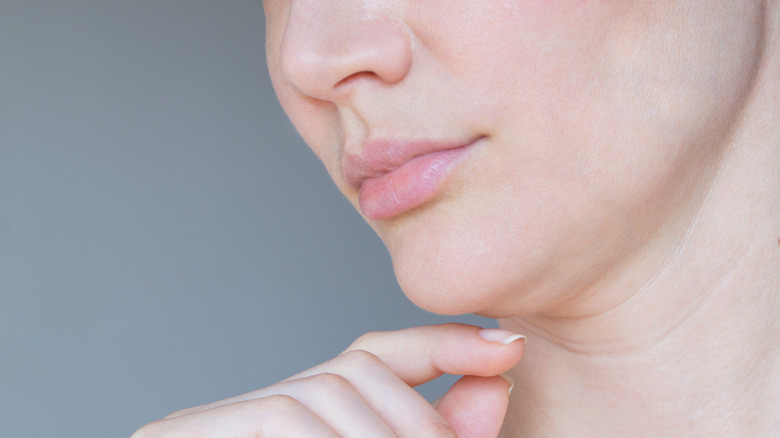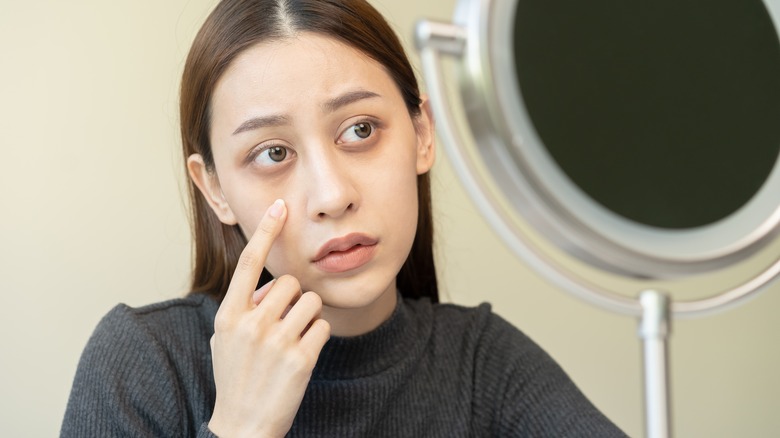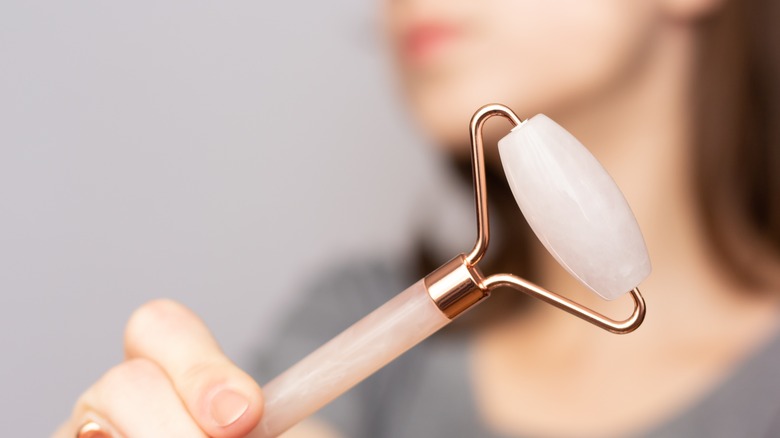Why A Puffy Face Can Be An Overlooked Sign Of PCOS
Polycystic ovary syndrome is a common hormonal disorder affecting those assigned females at birth. In PCOS, women have more male hormones, known as androgens, which can prevent ovulation. Since PCOS often inhibits the ability to ovulate regularly, it is one of the most common causes of female infertility, as per the CDC.
A PCOS diagnosis can lead to an increased chance of developing type 2 diabetes and high blood pressure along with heart issues and cancer of the endometrium (lining of the uterus). Though many with PCOS have cysts that grow in the ovaries, many do not. Some women may have irregular periods or very light periods though many have no periods at all.
Other common symptoms of PCOS include weight gain, breakouts, oily skin, and an increase in facial or body hair, such as on the chin, chest, and back (via Johns Hopkins Medicine). Hair may thin or fall out and skin may darken in the folds of the skin such as the armpits or under the breasts. There is also another sign that may not seem readily apparent: a puffy face.
Imbalanced hormones cause water retention
Everyone can wake up and have a puffy face now and then, from drinking too much or consuming too much salt the night before. Yet when you notice bodily changes that don't go away, that may be an indication that something is going on, especially if you have other symptoms of PCOS. Of course, any new symptoms should always be noted and checked out by your doctor.
Besides the physical ramifications of hormonal imbalance, symptoms that affect appearance can be very disheartening for many patients. Additionally, certain symptoms may go unnoticed, such as puffiness and bloat which can show up in the facial area and on the body (via Fertility Family). One of the hidden signs may be that your cheeks and eyes appear bloated, and you may also feel distended in the stomach area. That's because in PCOS, the hormones estrogen and progesterone are imbalanced and this leads to inflammation, water retention, and weight gain.
Since periods can be irregular or missing in PCOS, estrogen can build up and that causes water retention. As a result, your tissues underneath the skin hold onto extra water and can make the face and other areas of the body look puffy. Just as you often notice water retention and bloating before your period comes, when you have PCOS, it may be an ongoing issue.
Easing fluid retention in PCOS
If you've been diagnosed with PCOS, there are some things you can do to lessen the bloating. Facial rollers can help boost circulation which will get fluids moving, lessen puffiness, and smooth skin. Cooling eye patches may also help.
Additionally, insulin resistance is common in PCOS, which means the body has the insulin it needs but it's harder to utilize it properly. This can result in weight gain, which can also make your face appear fuller. According to WebMD, periods can often be regulated by losing a little weight. Losing 10% of body weight can lead to fewer symptoms, improve bloating and puffiness, and help decrease insulin resistance.
Eating nutritious and wholesome foods is a must. Make fruits, veggies, lean protein, and whole grains a part of every meal. Having 4-6 meals a day rather than the standard three may help keep blood sugar levels steady. Drink plenty of water to help reduce bloat and take a daily walk or engage in some kind of movement for 30 minutes a day.


